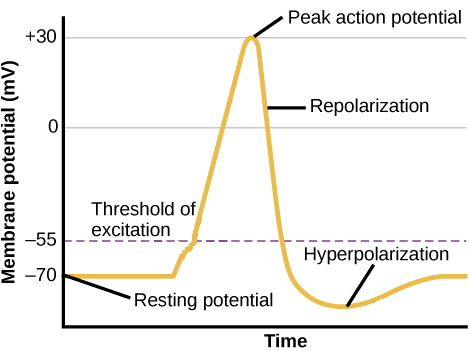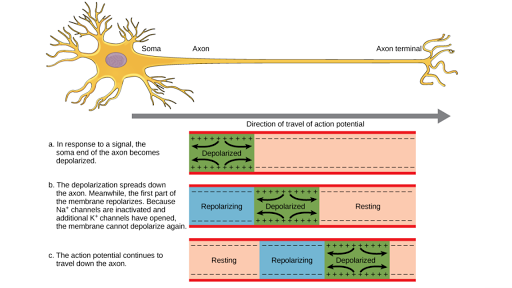Define Depolarization and Hyperpolarization and Their Relationship to Threshold
We review their content and use your feedback to keep the quality high. Hyper polarization is the opposite - the inside of the cell becomes more negative and the membrane potential moves away from the threshold.
Difference Between Depolarization And Hyperpolarization Definition Occurrence Role
Describe the process of depolarization of a neuron to threshold.

. The definition of depolarization in science is the elimination of polarity. Define depolarization and hyperpolarization and their relationship to threshold. Define depolarization and hyperpolarization and explain their relationship to threshold.
This problem has been solved. Who are the experts. In biology depolarization or hypopolarization is a change within a cell during which the cell undergoes a shift in electric charge distribution resulting in less negative charge inside the cell compared to the outside.
The first one is hypopolarization which precedes the depolarization while the second one is hyperpolarization which follows the repolarization. Hyperpolarization membrane becomes more negative. Define depolarization and hyperpolarization and their relationship to threshold.
The cell is therefore less likely to undergo an action potential. What does Cole mean when he says that anesthesia inhibits the neurons 4. During the depolarization an action potential is created due to the influx of Na into the axon via sodium channels located in the membrane.
Define Depolarization And Hyperpolarization And Their Relationship To Threshold. If depolarization is sufficient threshold is reached and the cell will undergo an action potential. Depolarization occurs when the inside of the cell becomes less negative.
Hyper polarization is the opposite - the inside of the cell becomes more negative and the membrane potential moves away from the threshold. Depolarization and hyperpolarization are two variations of the resting membrane potential. There are two more states of the membrane potential related to the action potential.
Hyperpolarization is when the difference in electrical potential between two sides of a cellular membrane changes significantly resulting in a large electrical potential across the. The polarizing current is altered in a ramp fashion from 50 percent depolarizing to 100 percent hyperpolarizing of the control threshold in steps of 10 percent. Threshold decrease is evident during extensive depolarization and threshold increase is evident with extensive hyperpolarization.
Membrane potential is the electrical charge across a membrane. However the actual meaning is slightly different. Define threshold potential and explain what happens when the membrane reaches the threshold.
Therefore the membrane potential goes from -70 mV to 0 mV in depolarization. Kevin is conscious when certain neurons in his brain are activethey depolarize and undergo action potentials. Define depolarization and hyperpolarization and their relationship to threshold.
We review their content and use your feedback to keep the quality high. When there are enough open Nachannels open it is possible for the axon hillock to. Hyperpolarization occurs when the inside of the cell becomes more negative.
With hyperpolarization there is an increase in the resistance of the internodal membrane due to closure of potassium channels and the resulting plot fans out. The opposite of hyperpolarization is depolarization in which a cells potential becomes more positive meaning that there is significantly less negative charge inside of the cell membrane. Three main triggering events in an action potential are described as.
- depolarization membrane potential becomes more positive. For instance in a physiological system like a cell depolarization. Depolarization and hyperpolarization occur when ion channels in the membrane open or close altering the ability of particular types of.
Define graded potential describe the relationship between the magnitude of the potential and the triggering event explain how they spread and list five types of graded potentials. Define depolarization and hyperpolarization and their relationship to threshold Explain why hemoglobin releases more oxygen at an actively working muscle than a. Depolarization is a change within a cell during which the cell undergoes a shift in electric chargedistribution resulting in less negative charge inside the cell.
Describe the process of depolarization of a neuron to threshold. Define depolarization and hyperpolarization and their relationship to the threshold. Depolarization triggers an action potential.
Depolarization repolarization and hyperpolarization. Hyperpolarization is when the membrane potential becomes more negative at a particular spot on the neurons membrane while depolarization is when the membrane potential becomes less negative more positive. Depolarization is essential to the function of many cells communication between cells and the overall physiology of an organism.
Na channels open up and allow Na ions to go inside the cell making it less negative. Kevin is conscious when certain neurons in his brain are activethey depolarize and undergo action potentials. Experts are tested by Chegg as specialists in their subject area.
Depolarization is followed by repolarization. Who are the experts. Hyperpolarisation is the shift in membrane potential to a more negative charge due to efflux of potassium K ions and inhibits the action potential.
Similar to threshold electrotonus the currentthreshold relationship typically is tested using 1-msec pulses at the end of subthreshold polarizing currents lasting 200 msec. Experts are tested by Chegg as specialists in their subject area. If depolarization is sufficient threshold is reached and the cell will undergo an action potential.
An action potential has three phases. The main difference between depolarization and hyperpolarization is that depolarization refers to a decrease in the resting membrane potential whereas hyperpolarization refers to an increase in the resting membrane potential. Depolarisation is the switch in electric charge distribution due to influx of sodium Na ions into the cell which results in less negative or more positive charge in the interior of the cell and initiates an action potential.
The cell is therefore less likely to undergo an action potential.

Difference Between Depolarization And Hyperpolarization Compare The Difference Between Similar Terms

Difference Between Depolarization And Hyperpolarization Compare The Difference Between Similar Terms

Depolarization Hyperpolarization Neuron Action Potentials Article Khan Academy

Depolarization Hyperpolarization Neuron Action Potentials Article Khan Academy
No comments for "Define Depolarization and Hyperpolarization and Their Relationship to Threshold"
Post a Comment